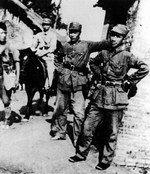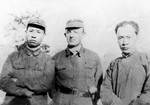Chen Yi
| Surname | Chen |
| Given Name | Yi |
| Born | 26 Aug 1901 |
| Died | 6 Jan 1972 |
| Country | China |
| Category | Military-Ground |
| Gender | Male |
Contributor: C. Peter Chen
ww2dbaseChen Yi was born into a wealthy magistrate's family in Lezhi County, Sichuan Province, Qing Dynasty China. He graduated from a technical school in Chengdu, Sichuan Province in 1916. In 1919, he traveled to France to study, but he was deported back to China in Oct 1921 as his political activities angered the French authorities that oversaw the administration of visiting foreign students. In 1922, he joined a socialist society; in the following year, he joined the Chinese Communist Party while studying in Beiping, China. In 1927, he became a Communist representative in the Central Military and Political School in Wuhan, Hubei Province, China. He married Xiao Juying in Xinfeng, Jiangxi Province, China in 1930; Xiao committed suicide in 1931. In 1932, he married Communist guerrilla fighter Lai Yueming, who would also commit suicide in the 1930s after being captured by the Nationalists. During the first phase of the Chinese Civil War, he commanded the Communist 4th Division, served as the political officer of Communist 6th Corps, commanded Communist 22nd Corps, and various political positions. In 1937, troops under his command were surrounded and denied supplies, but he was saved by the Xi'an Incident in which Nationalist leader Chiang Kaishek was forced to halt the civil war to face the Japanese threat. During the Second Sino-Japanese War, Major General Chen Yi played only a small role in anti-Japanese efforts, seeing combat mostly against Nationalist Chinese forces. In 1940, he married Zhang Qian, with whom he would have three sons and a daughter. As the deputy commanding officer of the New Fourth Army, he achieved fame among Communist leadership by turning the near defeat at the Battle of Huangqiao in Jiangsu Province, China into a stunning Communist victory. Chiang ordered the rebellious New Fourth Army disbanded after the Battle of Huangqiao, but Communist leadership refused to comply, defiantly recalled the remnant of New Fourth Army to Shanxi Province, China for recuperation, placing Chen at its helm. He would see no major combat for the remainder of WW2. During the resumed Chinese Civil War in the late 1940s after the end of WW2, he was successful in the Huaihai Campaign, taking control of vast areas in the lower Yangtze River region. After the Nationalist withdraw to Taiwan, he entered politics, serving as the mayor of Shanghai, China between 1949 and 1958 while holding command of the Communist 3rd Corps. Between 1954 and 1972, he served as the vice premier. He was given the title of Marshal of the People's Liberation Army in 1955. Between 1956 and 1967, he served on the Politburo. Between Feb 1958 and 1972, he took on a concurrent role as the foreign minister. In 1966, he was made the deputy chairman of the Central Military Committee. He was criticized during the Cultural Revolution, but he would survive the purge, though he would serve only in inconsequential posts for the remainder of his career. He passed away from cancer in Beijing, China in 1972.
ww2dbaseSource: Wikipedia
Last Major Revision: Aug 2015
Chen Yi Interactive Map
Photographs
 |  |
Chen Yi Timeline
| 26 Aug 1901 | Chen Yi was born in Lezhi County, Sichuan Province, Qing Dynasty China. |
| 6 Jan 1972 | Chen Yi passed away in Beijing, China. |
Did you enjoy this article or find this article helpful? If so, please consider supporting us on Patreon. Even $1 per month will go a long way! Thank you. Share this article with your friends: Stay updated with WW2DB: |
» Hundred Regiments Offensive
» Battle of Huangqiao
» New Fourth Army incident
- » 1,146 biographies
- » 336 events
- » 43,422 timeline entries
- » 1,237 ships
- » 349 aircraft models
- » 207 vehicle models
- » 372 weapon models
- » 123 historical documents
- » 259 facilities
- » 468 book reviews
- » 28,395 photos
- » 432 maps
Chiang Kaishek, 31 Jul 1937